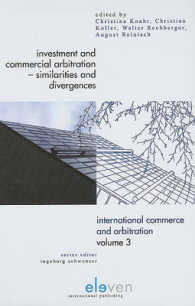Full Description
Mentoring in educational contexts has become a rapidly growing field of study, both in the United States and internationally (Fletcher & Mullen, 2012). The prevalence of mentoring has resulted in the mindset that "everyone thinks they know what mentoring is, and there is an intuitive belief that mentoring works" (Eby, Rhodes, & Allen, 2010, p. 7). How do we know that mentoring works? In this age of accountability, the time is ripe for substantiating evidence through empirical research, what mentoring processes, forms, and strategies lead to more effective teachers and administrators within P-12 contexts.
This book is the sixth in the Mentoring Perspectives Series, edited by Dr. Frances Kochan former Dean of the College of Education at Auburn University. This latest book in the series, co-edited by Linda J. Searby and Susan K. Brondyk, brings together reports of recent research on mentoring in K-12 settings for new teachers and new principals. The book has already garnered accolades from mentoring experts:
Contents
Foreword, Frances Kochan.
Book Introduction, Linda J. Searby and Susan K. Brondyk.
Chapter 1. Introduction: The Complexities of Identifying Mentoring Best Practices, Linda J. Searby and Susan K. Brondyk.
Chapter 2. Developing Mentors Across Contexts: The Reciprocity of Mentorship in School/University Partnerships, Danielle V. Dennis and Audra K. Parker.
Chapter 3. Impactful Mentoring Within a Statewide, Comprehensive Induction Program, Amanda R. Bozack and Amy Nicole Salvaggio.
Chapter 4. Reflection Rounds in the Context of Virtual Mentoring, Carmen Gloria Núñez, Verónica López, Bryan González, Carola Rojas, Evelyn Mujica, Evelyn Palma, and Cristina Julio.
Chapter 5. Face-to-Face, Online, and Hybrid Mentoring in a Professional Development Program, Ya-Wen Cheng, Deborah L. Hanuscin, and Mark J. Volkmann.
Chapter 6. Empowering Teachers Through Mentoring, Elizabeth Doone, Karen Colucci, Laura Von Staden, and Dominique Thompson.
Chapter 7. Crossing Borders on the Border: Implementation of a Mentoring Network, Etta Kralovec and Laura Gail Lunsford.
Chapter 8. Building Induction Capacity: Collaboration, Formative Assessment, and Systems Thinking, Lara H. Hebert and Elizabeth A. Wilkins.
Chapter 9. Promising Practices for Developing Teacher Leaders in High Schools: The Principal's Role, Tricia Browne-Ferrigno, Amanda Perry Ellis, and Matthew Douglas Thompson.
Chapter 10. How an Assistant Principals' Academy Evolved Into Dynamic Group and Peer Mentoring Experiences, D. K. Gurley and L. Anast-May.
Chapter 11. Mentoring for New Principals in Urban School Districts: One Size Does Not Fit All, Constance Magee and Charles L. Slater.
Chapter 12. Leaders Helping Leaders: Mentoring After Mentoring Ends, John Daresh.
Chapter 13. Best Practices for Supporting Beginning Principals as Instructional Leaders: The Consultant Coaching Model, Mary Bearden Martin and Linda J. Searby.
Chapter 14. Mentoring Midcareer Principals to Build Capacity for Change in Schools, Kenyae L. Reese, Jane Clark Lindle, Matthew R. Della Sala, Robert C. Knoeppel, and Hans W. Klar.
Chapter 15. A Summary of Best Practices in Mentoring for Teacher and Leader Development, Linda J. Searby and Susan K. Brondyk.






